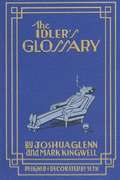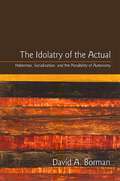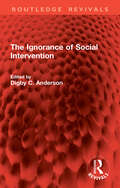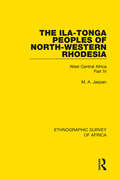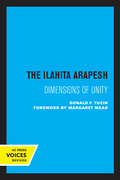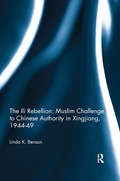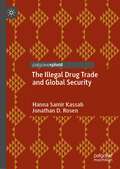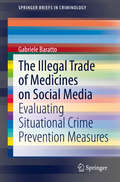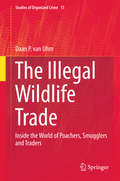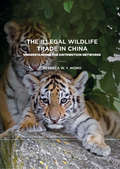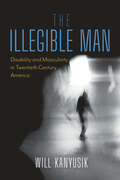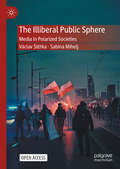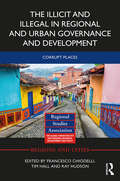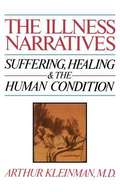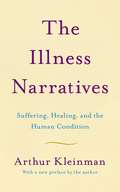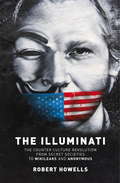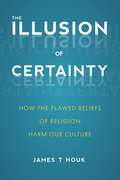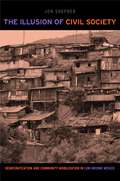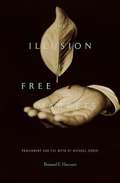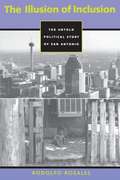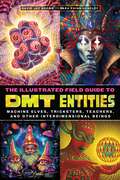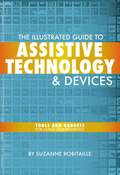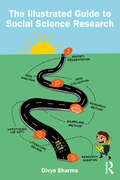- Table View
- List View
The Idler's Glossary
by Seth Joshua Glenn Mark KingwellFor as long as mankind has had to work for a living, people who work have disparaged those who prefer not to. This glossary playfully explores the etymology and history of hundreds of idler-specific terms and phrases, while offering a foundation for a new mode of thinking about work and labor.
The Idolatry of the Actual: Habermas, Socialization, and the Possibility of Autonomy (SUNY series in the Philosophy of the Social Sciences)
by David A. BormanThe first close study of Jürgen Habermas's theory of socialization, a central but infrequently discussed component of his defense of deliberative democracy, The Idolatry of the Actual charts its increasingly uneasy relationship with the later development of Habermas's social theory. In particular, David A. Borman argues that Habermas's account of the development of the subject and of the conditions under which autonomy can be realized is fundamentally at odds with the increasingly liberal tenor of his social theory. This leads Borman to return to the set of concerns that guided Habermas's social theory in the early 1970s, paying particular attention to questions of crisis and the means by which public reactions are shaped—questions perhaps more relevant today than they have been at any time since the 1930s. Using Habermas's early work as a framework, Borman constructs an original critical-theoretical argument that draws on research in the sociology of schooling to understand how attitudes toward work, reward, achievement, class, gender, and race are shaped in economically functional ways, and draws on philosophical and empirical scholarship to demonstrate the challenges of multicultural integration and the impact of both on the potential for progressive social transformation.
The Ignorance of Social Intervention (Routledge Revivals)
by Digby C. AndersonMost objections to state intervention in social life are made on overtly political or moral grounds. Originally published in 1980, the theme of this book is similarly to criticise intervention programmes, but on fundamentally empirical grounds. Rather than investigate the extent of the ignorance in social intervention, it chooses to look at several forms of intervention – Field Social Work, Youth Work, School Health Education, The Manpower Services Commission, the Social Science Research Council and Community Health, and discusses the types and variety of ignorance which aspects of these display.It is demonstrated that the failure of social intervention is due to the defective nature of the knowledge ‘bases’ of such intervention sociology. The book investigates the suspicion that those who research, enact and implement social change policies in any of the above-mentioned fields, do not really know what they are doing. Of course there is no necessity that intervention is so ill-informed. Yet an awareness of the reasons for the inadequacies of past interventions must be gained if future failures are to be avoided.
The Ila-Tonga Peoples of North-Western Rhodesia: West Central Africa Part IV
by M. A. JaspanRoutledge is proud to be re-issuing this landmark series in association with the International African Institute. The series, published between 1950 and 1977, brings together a wealth of previously un-co-ordinated material on the ethnic groupings and social conditions of African peoples. Concise, critical and (for its time) accurate, the Ethnographic Survey contains sections as follows: Physical Environment Linguistic Data Demography History & Traditions of Origin Nomenclature Grouping Cultural Features: Religion, Witchcraft, Birth, Initiation, Burial Social & Political Organization: Kinship, Marriage, Inheritance, Slavery, Land Tenure, Warfare & Justice Economy & Trade Domestic Architecture Each of the 50 volumes will be available to buy individually, and these are organized into regional sub-groups: East Central Africa, North-Eastern Africa, Southern Africa, West Central Africa, Western Africa, and Central Africa Belgian Congo. The volumes are supplemented with maps, available to view on routledge.com or available as a pdf from the publishers.
The Ilahita Arapesh: Dimensions of Unity
by Donald F. TuzinThis title is part of UC Press's Voices Revived program, which commemorates University of California Press’s mission to seek out and cultivate the brightest minds and give them voice, reach, and impact. Drawing on a backlist dating to 1893, Voices Revived makes high-quality, peer-reviewed scholarship accessible once again using print-on-demand technology. This title was originally published in 1976.
The Ili Rebellion: Muslim Challenge to Chinese Authority in Xingjiang, 1944-49
by Linda K. BensonIn 1944 Moslem forces in China's westernmost province of Xinjiang rose against the Chinese authorities and succeeded in establishing a small independent Islamic state - the East Turkestan Republic. Based on newly available archival material, this book describes the Moslem challenge to Chinese rule and documents the Nationalist government's response to newly awakened Turkic-Moslem nationalism on China's most remote and politically sensitive north-western frontier. With this book, Linda Benson aims to break new ground in the study of Sino-Soviet relations and especially of the policies of Chinese governments toward their national minorities.
The Illegal Drug Trade and Global Security
by Jonathan D. Rosen Hanna Samir KassabThis book explores global drug trafficking networks’ impact on international security and provides an in-depth analysis of drug trafficking networks globally by integrating international relations and security studies theories. The book acts as a primer, simplifying the complicated world of narcotics and insecurity, while also providing policy recommendations for policy-makers hoping to reduce the power of organized criminal and terrorist networks globally. It will be of interest to undergraduate and postgraduates taking courses in International Relations, Global Politics, Defense Studies, Security Studies, and International Political Economy, as well as Criminal Justice, Sociology, and other social science disciplines that cover issues related to drug trafficking, organized crime, and violence.
The Illegal Trade of Medicines on Social Media: Evaluating Situational Crime Prevention Measures (SpringerBriefs in Criminology)
by Gabriele BarattoThis book evaluates the impact of situational crime prevention measures implemented by social media platforms to identifying, blocking, and removing content linked to illegal traded medicines. It discusses the extent of social media usage in trafficking of medicines; the ease of access; visibility of the content; language of posts; products most traded; and types of posts. Research results support the hypothesis of the limited impact of these measures, due not to a lack of effectiveness but to asymmetrical implementation. This volume will be of interest to researchers, law enforcement, policy makers, social media groups, public health practitioners.
The Illegal Wildlife Trade
by Daan P. UhmIn this book the author examines the illegal wildlife trade from multiple perspectives: the historical context, the impact on the environment, the scope of the problem internationally, the sociocultural demand for illegal products, the legal efforts to combat it, and several case studies from inside the trade. The illegal wildlife trade has become a global criminal enterprise, following in the footsteps of drugs and weapons. Beyond the environmental impact, financial profits from the illegal wildlife trade often fund organized crime groups and violent gangs that threaten public safety and security in myriad ways. This innovative volume covers several key questions surrounding the wildlife trade: why is there a demand for illegal wildlife products, which actors are involved in the trade, how is the business organized, and what are the harmful consequences. The author performed ethnographic fieldwork in three key markets: Russia, Morocco, and China, and has constructed a detailed picture of how the wildlife trade operates in these areas. Conversations with informants directly involved in the illegal business ensure unique insights into this lively black market. In the course of his journey the author follows the route of the illegal wildlife trade from poor poaching areas to rich business districts where corrupt officials, legally registered companies, wildlife farms and sophisticated criminal organizations all have a share. A fascinating look inside the world of poachers, smugglers and traders.
The Illegal Wildlife Trade in China: Understanding The Distribution Networks (Palgrave Studies in Green Criminology)
by Rebecca W. WongThis book offers a theoretically-based study on crimes against protected wildlife in mainland China with first-hand empirical data collected over five years. It provides an overall examination of crimes against protected and endangered wildlife and an extensive account of the situation in China, where a significant portion of the illegal wildlife trade is currently happening. This emerging field has become an important topic for enforcement and governments alike yet remains an under-researched area. The collected data covers illegal tiger-parts trade, the illegal ivory trade, and the consumption of protected wildlife. The book will serve as a useful reference for scholars, law-enforcement agencies, lawyers, and conservation and wildlife-protection NGO groups to facilitate their understanding of the growing illegal trade in protected and endangered wildlife. The Illegal Wildlife Trade in China has three general aims: first, to contribute to the general development of green criminology and specifically to the literature of the illegal transactions of protected wildlife at the distribution stage. Second, it aims to understand how illegal transactions are carried out to create insights for policy makers and law enforcement professionals. Finally, Wong seeks to apply theoretical frameworks (such as that of trust, networks, and situational crime prevention) to the understanding of the distribution of illegal wildlife products in order to make contributions to ongoing sociological and criminological discussions.
The Illegible Man: Disability and Masculinity in Twentieth-Century America
by Will KanyusikHow does the sudden onset of disability impact the sense of self in a person whose identity was, at least in part, predicated on the possession of what is culturally understood to be an "able" body? How does this experience make visible the structures enabling society's shared notions of heteronormative masculinity?In the United States, the Second World War functioned as a key moment in the emergence of modern understandings of disability, demonstrating that an increased concern with disability in the postwar period would ultimately lead to greater incoherence in the definitions and cultural meanings of disability in America. The Illegible Man examines depictions of disability in American film and literature in twentieth-century postwar contexts, beginning with the first World War and continuing through America's war in Vietnam. Will Kanyusik searches for the origin of discourse surrounding disability and masculinity after the Second World War, examining both literature and film—both fiction and documentary—their depictions of disability and masculinity, and how many of these texts were created by the relationship between the culture industry and the Office of War Information in the 1940s.Supported by original archival research, The Illegible Man presents a new understanding of disability, masculinity, and war in American culture.
The Illiberal Public Sphere: Media in Polarized Societies
by Sabina Mihelj Václav ŠtětkaThis open access book provides the first systematic analysis of the role of the media in the rise of illiberalism, based on an original theoretical framework and extensive empirical research in Eastern Europe – a region that serves as a key battleground in the global advance of illiberalism. Liberal democracies across the world are facing a range of challenges, from the growing influence of illiberal leaders and parties to deepening polarization and declining trust in political elites and mainstream media. Although these developments attracted significant scholarly attention, the factors that contribute to the spreading of illiberalism remain poorly understood, and the communication perspective on illiberalism is particularly underdeveloped.Štětka and Mihelj address this gap by introducing the concept of the illiberal public sphere, identifying the key stages in its development, and explaining what makes illiberalism distinct from related phenomena such as populism. Their analysis reveals how and why the changing communication environment facilitates selective exposure to ideologically and politically homogeneous sources, fosters changes in normative assumptions that guide media trust, increases vulnerability to disinformation, and goes hand in hand with growing hostility to immigration and LGBTQ+ rights. The findings challenge widespread assumptions about digital platforms as key channels of illiberalism and suggest that their role shifts as the illiberal sphere progresses.The arguments presented in this book have important implications for future research on challenges to liberal democracy, as well as for journalists, media regulators and other professionals committed to rebuilding media trust and containing the forces of polarization.
The Illicit and Illegal in Regional and Urban Governance and Development: Corrupt Places (Regions and Cities)
by Tim Hall Ray Hudson Francesco ChiodelliDiscussions of the illicit and the illegal have tended to be somewhat restricted in their disciplinary range, to date, and have been largely confined to the literatures of anthropology, criminology, policing and, to an extent, political science. However, these debates have impinged little on cognate literatures, not least those of urban and regional studies which remain almost entirely undisturbed by such issues. This volume aims to open up debates across a range of cognate disciplines. The Illicit and Illegal in Regional and Urban Governance and Development is a multidisciplinary volume that aims to open up these debates, extending them empirically and questioning the dominant discussions of governance and development that have been rooted largely or entirely in the realm of licit and legal actors. The book investigates these issues with reference to a variety of different geographical contexts, including, but not limited to, places traditionally considered to be associated with illegal activities and extensive illicit markets, such as some regions in the so-called Global South. The chapters consider the ways in which these questions deeply affect the daily lives of several cities and regions in some advanced countries. Their comparative perspectives will demonstrate that the illicit and the illegal are an underappreciated structural aspect of current urban and regional governance and development across the globe. The book is an edited collection of research-informed essays, which will primarily be of interest to those taking advanced undergraduate and taught postgraduate courses in human geography, urban and regional planning and a range of social science disciplines that have an interest in urban and regional issues and issues related to crime and corruption.
The Illness Narratives: Suffering, Healing, And The Human Condition
by Arthur KleinmanA Harvard psychiatrist and anthropologist argues that interpreting the illness experience is an art tragically neglected by modern medical training, and presents a compelling case for bridging the gap between patient and doctor. Based on twenty years of clinical experience studying and treating chronic illness, a Harvard psychiatrist and anthropologist argues that diagnosing illness is an art tragically neglected by modern medical training, and presents a compelling case for bridging the gap between patient and doctor.
The Illness Narratives: Suffering, Healing, And The Human Condition
by Arthur KleinmanFrom one of America's most celebrated psychiatrists, the book that has taught generations of healers why healing the sick is about more than just diagnosing their illness.Modern medicine treats sick patients like broken machines -- figure out what is physically wrong, fix it, and send the patient on their way. But humans are not machines. When we are ill, we experience our illness: we become scared, distressed, tired, weary. Our illnesses are not just biological conditions, but human ones. It was Arthur Kleinman, a Harvard psychiatrist and anthropologist, who saw this truth when most of his fellow doctors did not. Based on decades of clinical experience studying and treating chronic illness, The Illness Narratives makes a case for interpreting the illness experience of patients as a core feature of doctoring.Before Being Mortal, there was The Illness Narratives. It remains today a prescient and passionate case for bridging the gap between patient and practitioner.
The Illuminati: The Counter Culture Revoultion from Secret Societies to Wikileaks and Anonymous
by Robert HowellsThis book demonstrates that the old secret societies were driven by the same impulse as Anonymous and WikiLeaks are today. These marginalized groups have always rebelled against the establishments; some subversively by spreading progressive ideas through art and literature, while others are far more proactive, driving revolution and exposing government secrets. The Illuminati, founded in 1776, aimed to rid Europe of the ruling aristocracy and religious control of education, politics and science. They supported the Age of Enlightenment and were accused of fueling the dissent that culminated in the French Revolution. Since that time the term Illuminati has become a meme, giving a name to a secret network believed by conspiracy theorists to control the world. These were depicted as pranksters, working in the shadows to manipulate society. It was in this climate of pranks, memes and conspiracy theories that the hacktivist collective Anonymous were born. Their ideals of freedom from censorship and the empowering of societies against their rulers make them the spiritual successors of the Illuminati. The kindling of the French Revolution by the Illuminati has found a modern counterpart in how Anonymous and WikiLeaks played a key role in the Arab Spring uprisings using the internet as a new weapon against dictatorships. It is the same battle fought by secret societies for a millennium but the new inquisition has shifted its focus from secret societies to wage a war on the connected communities of the internet age. This is the story of that war and how you need to be a part of it.
The Illusion of Certainty: How the Flawed Beliefs of Religion Harm Our Culture
by James T. HoukIn this examination of religion's influence on society, an anthropologist critiques fundamentalism and all mindsets based on rigid cultural certainties. The author argues that the future can only be safeguarded by a global humanistic outlook that recognizes and respects differing cultural perspectives and endorses the use of critical reason and empiricism. Houk coins the term "culturalism" to describe dogmatic viewpoints governed by culture-specific values and preconceived notions. Culturalism gives rise not only to fundamentalism in religion but also stereotypes about race, gender, and sexual orientation.Turning specifically to Christian fundamentalism, the author analyzes the many weaknesses of what he calls a faith-based epistemology, particularly as such thinking is displayed in young-earth creationism, the reliance on revelation and subjective experiences as a source of religious knowledge, and the reverence accorded the Bible despite its obvious flaws. As he points out, the problem with such cultural knowledge generally is that it is non-falsifiable and ultimately has no lasting value in contrast to the data-based and falsifiable knowledge produced by science, which continues to prove its worth as a reliable source of accurate information.Concluding that there is no future to the fundamentalist mindset in a diverse world where religion often exacerbates conflicts, he makes a strong case for reason and mutual tolerance.
The Illusion of Civil Society: Democratization and Community Mobilization in Low-Income Mexico
by Jon ShefnerMuch has been written about how civil society challenges authoritarian governments and helps lead the way to democratization. These studies show that neoliberal economic policies have harmed many sectors of society, weakening the state and undermining clientelistic relationships that previously provided material benefits to middle- and low-income citizens, who are then motivated to organize coalitions to work for greater social justice and equality. Recognizing this important role played by civil society organizations, Jon Shefner goes further and analyzes the variegated nature of the interests represented in these coalitions, arguing that the differences among civil society actors are at least as important as their similarities in explaining how they function and what success, or lack thereof, they have experienced. Through an ethnographic examination extending over a decade, Shefner tells the story of how a poor community on the urban fringe of Guadalajara mobilized through an organization called the Unión de Colonos Independientes (UCI) to work for economic improvement with the support of Jesuits inspired by liberation theology. Yet Mexico’s successful formal democratic transition, won with the elections in 2000, was followed by the dissolution of the coalition. Neither political access for the urban poor, nor their material well-being, has increased with democratization. The unity and even the concept of civil society has thus turned out to be an illusion.
The Illusion of Free Markets: Punishment and the Myth of Natural Order
by Bernard E. HarcourtIt is widely believed today that the free market is the best mechanism ever invented to efficiently allocate resources in society. Just as fundamental as faith in the free market is the belief that government has a legitimate and competent role in policing and the punishment arena. This curious incendiary combination of free market efficiency and the Big Brother state has become seemingly obvious, but it hinges on the illusion of a supposedly natural order in the economic realm. "The Illusion of Free Markets" argues that our faith in free markets has severely distorted American politics and punishment practices. Bernard Harcourt traces the birth of the idea of natural order to eighteenth-century economic thought and reveals its gradual evolution through the Chicago School of economics and ultimately into today s myth of the free market. The modern category of liberty emerged in reaction to an earlier, integrated vision of punishment and public economy, known in the eighteenth century as police. This development shaped the dominant belief today that competitive markets are inherently efficient and should be sharply demarcated from a government-run penal sphere. This modern vision rests on a simple but devastating illusion. Superimposing the political categories of freedom or discipline on forms of market organization has the unfortunate effect of obscuring rather than enlightening. It obscures by making both the free market and the prison system seem natural and necessary. In the process, it facilitated the birth of the penitentiary system in the nineteenth century and its ultimate culmination into mass incarceration today.
The Illusion of Inclusion: The Untold Political Story of San Antonio
by Rodolfo RosalesTo many observers, the 1981 election of Henry Cisneros as mayor of San Antonio, Texas, represented the culminating victory in the Chicano community's decades-long struggle for inclusion in the city's political life. Yet, nearly twenty years later, inclusion is still largely an illusion for many working-class and poor Chicanas and Chicanos, since business interests continue to set the city's political and economic priorities.<P><P>In this book, Rodolfo Rosales offers the first in-depth history of the Chicano community's struggle for inclusion in the political life of San Antonio during the years 1951 to 1991, drawn from interviews with key participants as well as archival research. He focuses on the political and organizational activities of the Chicano middle class in the context of post-World War II municipal reform and how it led ultimately to independent political representation for the Chicano community. Of special interest is his extended discussion of the role of Chicana middle-class women as they gained greater political visibility in the 1980s.
The Illusion of Well-Being: Economic Policymaking Based on Respect and Responsiveness
by Mark D. WhiteThe use of measures of economic output to guide policymaking has been criticized for decades because of their weak ties to human well-being. Recently, many scholars and politicians have called for measures of happiness or subjective well-being to be used to guide policy in people's true interests. In The Illusion of Well-Being, Mark D. White explains why using happiness as a tool for policymaking is misguided and unethical. Happiness is too vague a term to define, and too general a concept, to measure in a way that captures people's true feelings. He extends this critique to well-being in general and concludes that no measure of well-being can do justice to people's true interests, which are complex, multifaceted, and subjective. White suggests instead that policymaking be conducted according to respect and responsiveness, promoting the true interests of citizens while addressing their real needs, and devoting government resources to where they can do the most good.
The Illustrated Dictionary of Greek and Roman Mythology
by Michael StapletonAn outstanding reference for mythology study.
The Illustrated Field Guide to DMT Entities: Machine Elves, Tricksters, Teachers, and Other Interdimensional Beings
by David Jay Brown Sara Phinn Huntley• Examines 25 of the most commonly encountered DMT entities, from machine elves and fairies to insectoids, Reptilians, and divine beings such as Grandmother Ayahuasca• Discusses each entity in depth, including people&’s encounters with them from trip reports and scientific studies, descriptions of how the entities appear and behave, and communications or teachings they impart• Features visionary art by Sara Phinn Huntley and other artists, including Alex Grey, Andrew Jones, Luke Brown, Juliana Garces, Erial Ali, and Harry PackOne of the features consistently noted by visitors to the hyperspace realm invoked by DMT is the existence of many different entities. In this full-color illustrated handbook for understanding the intelligent alien species of hyperspace, psychedelic explorer David Jay Brown and visionary artist Sara Phinn Huntley explore 25 of the most commonly encountered DMT beings and ayahuasca spirits, from &“self-transforming machine elves,&” ancestor spirits, tricksters, and metallic spheres to insectoid mantis beings, reptilians, gray aliens, nature spirits, and divine beings, such as the Virgin Mary, Gaia, angels, Grandmother Ayahuasca, and deities from Hindu, Egyptian, and South American spiritual traditions.Profiling the DMT entities in the style of a naturalistic field guide, complete with evocative illustrations by Huntley and other artists such as Alex Grey, Andrew Jones, Luke Brown, Juliana Garces, Erial Ali, and Harry Pack, the authors discuss the entities in depth, including people&’s encounters with them, descriptions of how they appear, and summaries of the communications they impart. They explore whether these beings are generated by our minds or if they exist independently of the DMT trip.Providing a comprehensive exploration of this world, this guide seeks to describe the alien residents of interdimensional space and help people who have encountered DMT beings integrate their experiences.
The Illustrated Guide to Assistive Technology and Devices: Tools and Gadgets for Living Independently
by Suzanne Robitaille"A Doody's Core Title 2012"This new illustrated guide to assistive technologies and devices chronicles the use of AT/AD - technology used by individuals with disabilities to perform functions that might otherwise be difficult or impossible. This book empowers people to use assistive technologies to overcome some of their physical or mental limitations and have a more equal playing field. It includes real-life examples about how people with disabilities are using assistive technology (AT) to assist them in daily tasks, and discusses emotional issues related to AT/AD.
The Illustrated Guide to Social Science Research
by Divya SharmaThis accessible and engaging textbook helps students to get to grips with key concepts, issues, and practices in social science research through the use of fun and informative illustrations and examples. Written and illustrated by an experienced teacher of research methods in the social sciences, each chapter explains research concepts while using everyday examples and illustrations to make applied research comprehensive to students. It explains the step-by-step process for carrying out research through a range of topics and approaches, including survey research, research ethics, sampling, and experimental research. Chapters also include learning objectives, class activities, key terms, helpful hints, and suggestions for further reading. This book will be essential reading for any undergraduate research methodology class in the social sciences.
